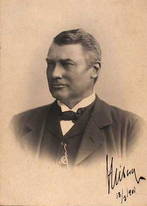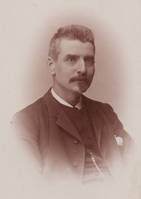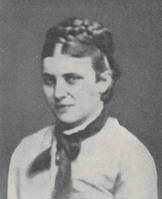1871.02.09 English
copenhagen february nine eighteen hundred and seventyone[1]
dearest brother
my sweet kathrine and i would like to thank you and dear mother for your dear letters yes it was an immense grief to us that dear father-in-law[2] passed away and although having witnessed him becoming increasingly weak the last few months yet we couldn’t bring ourselves to believe that the end was so near already when dear brother-in-law peter from thisted[3] was here in order to bury his beloved wife and his new-born son[4] he told us he feared that his father’s illness would be his demiseduring the entire christmas father-in-law was bedridden after christmas his condition deteriorated but during his last days in life he was here and without pains the graveside ceremony was over there[5] i had set my mind to travel over there but then my own catherine fell ill and i had to stay and take care of her she had to stay in bed for ten days but thanks to god she is now fully recovered wee little sarah had to be weaned and fortunately it went very well she seems to thrive much better on food and a blend of cow’s milk and water than on breast milk all our toddlers have been in good health all the time thank god kathrine’s illness was a nervous disorder and in connection with that a disorder of the blood probably as a consequence of the many childbirths during a short period of time and also caused by all the grief we have had[6]
dear father-in-law’s body was brought here and luckily the hearse with his body was able to cross the water down by koster[7] all the farmers of the parish [8] accompanied all the way from kieldby[9] to koster this is where the funeral ceremony took place quietly from the chapel of the churchyard of assistens i gave a short speech in the chapel and pronounced the blessing over his mortal remains when they had been lowered into the grave all the sons were present at the graveside ceremony in kieldby dean hiort from elmelunde gave the funeral oration in the church and spoke most beautifully
we are longing to hear how our dear sweet mother is doing in this hard winter period i have the fondest greetings to mother from my sweet kathrine and the message that she is going to write to her soon my writing ball is soon to be presented in public once again in a new or rather several new versions and in addition much improved a youngster son of a widow has now for three months been practising in the use of the writing ball i pay him .......[10] per second[11] the more he earns he has now earned a total of fortytwo daler[12] and has achieved a surprising skill everything that i dictate to him at a normal rate of speaking he types with the greatest ease he is now far more skilled than i am at the school i am starting to enjoy very much teaching speech skills and by now almost the entire instruction in my class is done in verbal[13] danish and the children speak quite clearly and already do fairly good lip-reading i myself have been enjoying very good health throughout best regards to our dear sweet mother and to you dear brother john and to you dear brother please write to me soon
your deeply devoted brother
R. Malling Hansen (signed)
[1] This letter was typed on an early version of the writing ball. Only lower-case letters were used, and RMH applied no punctuation marks.
[2] The deceased is Cathrine’s father , Søren Johan Heiberg– previously director of The Royal Institute for the deaf. RMH’s own father died when RMH was only 5 years old.
[3] Thisted was and is a very small provincial town in the north-western corner of Denmark. At the time of the letter, it would probably take some 3 days to travel between Copenhagen and Thisted.
[4] This is a very tragic event. Peter Wilken Heiberg is the brother of Cathrine, the wife of RMH. And his wife Zarah and the baby have just died at delivery. Terrible!
[5] It is hard to understand what RMH refers to by ‘over there’. He was ‘here’ during Christmas without pain. How can a sick person be transported from Jylland to Copenhagen and return in such a short time? And where might the father-in-law have had his permanent address? Was he staying with his son in Thisted? We know from a later letter that the mother-in-law, Emma Heiberg, born Rørdam, later lives with one of the sons. And why were Peter’s wife and son buried in Copenhagen – had they not been staying with him in Thisted? It is rather enigmatic!
[6] These lines are exceedingly difficult to read. It is, of course, the first version of the writing ball – and the whole thing is very hard to read from the photocopy – but these lines are almost impossible!
[7] Ilegible
[8] Ilegible
[9] Ilegible
[10] Unfortunately an entire line here is impossible to read – so much more the pity since this part is dealing with exciting information
[11] Here is probably an EXTREMELY important information about the writing ball – that we simply have to reconstruct. Maybe the reference here is to the young writing ball typist, that we see on our photos or drawings from the world exhibitions. Who was this young writing ball typist???? How do we find our his identity?
[12] Danish coin in use at the time (before the crown)
[13] RMH is referring to the method of using verbal, normal speech to children with special education needs, as opposed to sign language
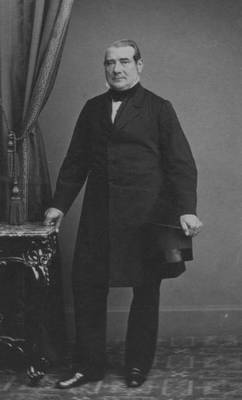
- Malling-Hansen's father-in-law, who just died; Søren Johan Heiberg, 1810-1871. Photo: The Heiberg Museum in Norway
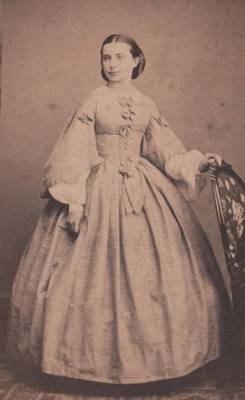
- Malling-Hansen's first wife, Cathrine Georgia Heiberg, 1841-1876. Photo: Private

